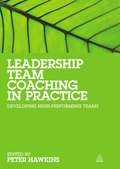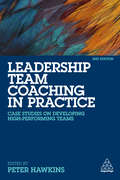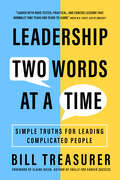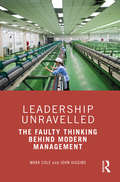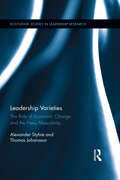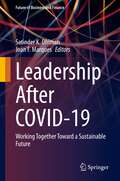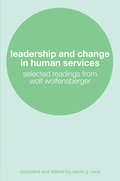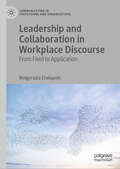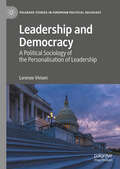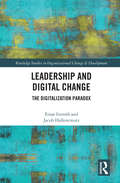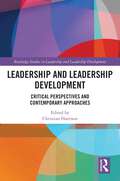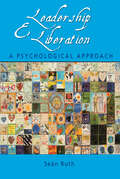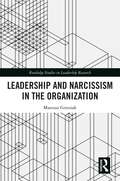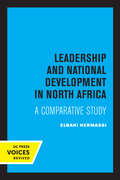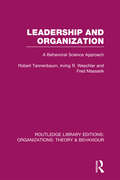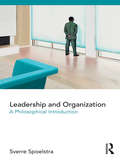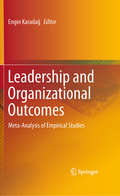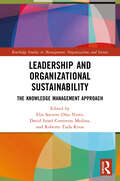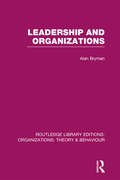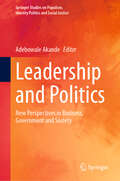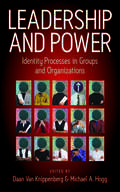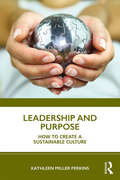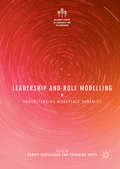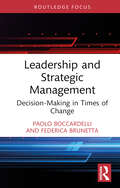- Table View
- List View
Leadership Team Coaching in Practice
by Peter HawkinsLeadership Team Coaching in Practice looks at how leadership team coaching techniques have been applied internationally across a variety of team types and sectors. With expert contributors including chief executives, team coaches, team leaders and consultants, this practical guide offers a range of real case studies to illustrate best practice with a detailed analysis of methods and processes tailored to the needs of each organization. Readers will learn how to develop their own unique approach to fostering collective transformational leadership across teams, whatever their business sector and whatever type of team they lead. The book can be used either as a stand-alone workbook or as a practical companion to Leadership Team Coaching, which offers a comprehensive introduction to creating and developing high performing teams through transformational leadership.
Leadership Team Coaching in Practice: Case Studies on Developing High-Performing Teams
by Peter HawkinsOrganizations are increasingly complex, requiring flexibility to implement significant, rapid change that goes beyond the ability of an individual leader or CEO. A high-performing and cohesive leadership team is critical for success. Leadership Team Coaching in Practice presents enlightening case studies on how leadership team coaching techniques have been applied internationally across a variety of team types and industries, including professional services, pharmaceuticals, airlines, healthcare and finance. With expert contributions from chief executives, team coaches, team leaders and consultants, this practical guide illustrates best practice tailored to the needs of each organization. This fully updated 2nd edition of Leadership Team Coaching in Practice includes new case studies and addresses hot topics in systemic leadership coaching theory. Answering questions such as how do you get the most from working across multiple teams? how should inter-team coaching be approached? and how do you coach millennials and tech start-ups?, it helps foster collective transformational leadership, whatever the business sector and type of team. Ideal for executive coaches, organizational development consultants (OD), HR leaders and aspiring managers, it shows how to develop leadership teams that can implement strategic change effectively and sustain competitive advantage.
Leadership Transitions and Team Building: Leadership Collection (2 Books)
by Reid Hoffman Ben Casnocha Harvard Business Review Chris Yeh Michael D. WatkinsThe Leadership Transitions and Team Building Collection includes two important books: The First 90 Days, Updated and Expanded, by Michael D. Watkins, and The Alliance, by Reid Hoffman, Ben Casnocha, and Chris Yeh. Transitions are a critical time for leaders. In fact, most agree that moving into a new role is the biggest challenge a manager will face. While transitions offer a chance to start fresh and make needed changes in an organization, they also place leaders in a position of acute vulnerability. Missteps made during the crucial first three months in a new role can jeopardize or even derail your success. In The First 90 Days, Watkins offers proven strategies for conquering the challenges of transitions-no matter where you are in your career. The Alliance, coauthored by the founder of LinkedIn, introduces a new, realistic loyalty pact between employer and employee. The employer-employee relationship is broken, and managers face a seemingly impossible dilemma: the old model of guaranteed long-term employment no longer works in a business environment defined by continuous change, but neither does a system in which every employee acts like a free agent. The solution? Stop thinking of employees as either family or as free agents. Think of them instead as allies. This bold but practical guide for managers and executives will give you the tools you need to recruit, manage, and retain the kind of employees who will make your company thrive in today's world of constant innovation and fast-paced change.
Leadership Two Words at a Time: Simple Truths for Leading Complicated People
by Bill TreasurerFor newcomers and upper management alike, leadership can be overwhelming and overcomplicated. By building core tenets of leadership around two key words for each chapter, Bill Treasurer simplifies the equation.Congratulations, new leader! You've joined the ranks during an exceptionally complicated time.Our current workplace climate is fraught with political divisions, economic disparities, and ever-shifting social dynamics. Leaders are managing remote teams across larger geographic distances and facing new roadblocks to onboarding, giving performance feedback, and nurturing healthy relationships. Leadership Two Words at a Time speaks directly to the plight of the new leader and is divided into three parts: Leading Yourself, Leading People, and Leading Work. Rather than overintellectualize the practice, Bill Treasurer breaks up the concept into essential and understandable learning nuggets-summed up by two-word headers-that provide the practical guidance and support that leaders often don't get. The result is time-tested wisdom that new leaders can grasp immediately and implement easily-and, with a little practice, master completely. Consider it a personal leadership playbook.This book gives you the basic building blocks to gain both competence and confidence, take on greater responsibility, and learn what it takes to be and stay a leader.
Leadership Unravelled: The Faulty Thinking Behind Modern Management
by John Higgins Mark ColeWhy is it that leaders – in social, political, and (most importantly) organisational contexts – are seemingly unable to address meaningfully the wicked problems and complex challenges that we currently face? There’s enormous busyness around reconfiguring departments and adopting ‘transformational’ operating models, but in general plus ca change, plus la meme chose. Eyewatering amounts of treasure and time are spent in corporate life on leadership development, with people working hard to try and demonstrate that something useful has happened as a result. An entire pseudo-science has emerged to try and prove its worth, in part to justify the economic dividend that goes to those who make it to the upper levels of positional power. The fetishisation of leadership, especially strong leadership, fills our news outlets holding up carefully distorted images of great men (leadership is still deeply gendered) from across the worlds of politics, business, and sports. This book explores the persistently disappeared and unacknowledged constraints that inhibit leaders in every context. It argues that these constraints – defined in this volume in terms of five organisational paradoxes and six management myths – are found at large in society and are especially impactful in organisational life. By calling attention to, and exploring in rigorous detail, these paradoxes and myths, this book helps leaders, and the leadership systems they are part of, to wriggle free of the tacit assumptions that lock them into a cul-de-sac of simplistic prescription and heroic individualism. Once these mind-forged manacles are removed, new forms of leadership practice become possible, ones that are fit for purpose in engaging with a world facing systemic crisis and existential risk. This book is essential reading for leaders and managers at all levels looking for solutions to traditionally simplistic leadership practice and who want to affect systemic change. It will be beneficial to all those in the world of leadership development including business schools and HR departments.
Leadership Varieties: The Role of Economic Change and the New Masculinity (Routledge Studies in Leadership Research)
by Thomas Johansson Alexander StyhreIn all periods of time, there is a perceived shortage of qualified, credible, and robust leadership skills. At the same time, what is regarded as skilled leadership is contingent on economic, political, institutional, and cultural conditions specific for a period of time or a local setting. Leadership in the era of managerial capitalism was focused on planning and administration, and was seated in large-scale, divisionalized corporations. In the 1970s, this economic model started to wane and leadership was advanced as the solution to a series of economic and social concerns, now being a matter of meaning-making in the face of uncertainty and ambiguity. With the expansion of the finance industry and the deregulation of finance markets in the 1990s and in the new millennium, yet another leadership model increasingly prioritized economic value creation. In parallel to the economic, political and institutional changes, the idea of leadership has been strongly informed by new ideas about individualism and masculinity, adding to the understanding of leadership as what is anchored in widespread social beliefs about for example healthy life styles, the virtues of physical exercise, and novel gender relations. Aimed at scholars, researchers, students and policy makers in the fields of Leadership, Management History and Organizational Theory; Leadership Varieties examines predominant ideas about the qualities and virtues of leadership in a historical and cultural perspective.
Leadership after COVID-19: Working Together Toward a Sustainable Future (Future of Business and Finance)
by Satinder K. Dhiman Joan F. MarquesThe COVID-19 pandemic has permanently changed lives around the world and no dimension of life and leadership seems to have been spared from its wrath. It has also stirred us into thinking about novel approaches to lead organizations and societies toward a shared, sustainable future. This book offers novel perspectives on leadership and change management after the COVID-19 pandemic that take us beyond striving for thriving—perspectives that are grounded in emergent theory, research and practice. It highlights sustainable leadership and change management strategies to effectively deal with unpredictable and rapidly changing situations—particularly in a world that is increasingly volatile, uncertain, complex, and ambiguous (VUCA). This book also highlights engaging perspectives by specialists from different disciplines such as business, psychology, education, and health care. It serves as a practical guide in identifying and responding to leadership challenges and opportunities in each of the four VUCA categories of volatility, uncertainty, complexity, and ambiguity—and how they affect businesses, organizations, and societies as a whole.
Leadership and Change in Human Services: Selected Readings from Wolf Wolfensberger
by David G. RaceFor over forty years Wolf Wolfensberger has been a significant figure in the world of human services, especially in the field of learning disability. His work on normalization and citizen advocacy in the late 1960s and early 1970s has been acknowledged by supporters and critics alike to have been fundamental to developments in a number of countries, most notably his adopted country, and the USA, Canada, Australasia, and the UK. His further work in developing the theory of social role valorization, the successor to normalisation, and as a commentator on broader trends in society and their effects on vulnerable people and services for them has ensured his place as a major voice for values and the human worth of all people. Never afraid of controversy, his views have brought him into conflict with institutional vested interests and radical groups alike.In Leadership and Change in Human Services David Race introduces the reader to Wolfensberger's key ideas through a series of extracts, with commentary, from his published work. Throughout the edited selection, the emphasis is on placing Wolfensburger's work in contemporary context and examining its continuing relevance today. Including a comprehensive bibliography of Wolfensburger's written output, this text offers an invaluable source of reference to all those concerned with the recent history of the human services.
Leadership and Collaboration in Workplace Discourse: From Field to Application (Communicating in Professions and Organizations)
by Małgorzata ChałupnikThis book presents a comprehensive examination of how leadership and collaboration are discursively performed in professional communication, using real-world data from a UK public sector IT team. Taking an auto-ethnographic approach to workplace talk, the author examines the language involved in the performance of different team-based professional roles, examining how professional identity and relationships are indexed through casual face-to-face talk in an office environment. This investigation of how a group of people come together in an effort to achieve shared workplace goals relates to key debates in the area of professional communication, putting forward new theoretical and methodological frameworks for understanding and analysing how person-orientated aspects of professional communication shape discourses of work. This book appeals to a wide and interdisciplinary audience, including advanced undergraduate and postgraduate students, academics and researchers specialising in applied linguistics broadly, and professional communication in particular, as well as consultants and practitioners working across a wide range of professional sectors.
Leadership and Democracy: A Political Sociology of the Personalisation of Leadership (Palgrave Studies in European Political Sociology)
by Lorenzo VivianiThis book analyses political leadership, addressing key questions central to the ongoing debate on the transformation of contemporary democracies. What exactly is political leadership? How does the relationship between leadership and power shape democratic transformations? What role do individuals play in broader historical processes? How does the personalisation of politics manifest, and how does it differ between leader democracy and populism? Is there still room for charismatic leadership in modern democracies and societies? These are some of the critical questions explored in this volume. The book traces the sociological relationship between leadership and power from foundational theories in the social sciences, through the personalisation of politics, to the rise of leader democracy and populist leadership. This book will be of interest to scholars, students, and practitioners in the fields of political sociology, political science, and leadership studies, as well as anyone engaged in understanding the evolving dynamics of leadership in contemporary democracies.
Leadership and Digital Change: The Digitalization Paradox (Routledge Studies in Organizational Change & Development)
by Einar Iveroth Jacob HallencreutzDigitalization is on everyone’s lips as new technology changes business landscapes and conventional companies are outperformed by younger digital and agile contestants. In this volatile environment it seems more relevant than ever before to understand the aspects and business logic behind the elusive phenomenon called "digitalization". Never before have there been such great opportunities to unleash the full potential of technology within organizations to create long-standing competitive advantage. This book explains the strategy and practice of how to lead and control the people side of digital change in a dynamic world of uncertainty and social complexity, and as such the book snares the elusive phenomena of digitalization Digitalization drives behavioral change and calls for a new way of thinking among senior executives. In practice, reaping the benefits of digital technology is not as easy as it first appears to be. This book provides a map to navigate in the volatile business landscape where change occurs continuously because of digital technology. It provides an historical frame of the evolution of digital technology, decodes digitalization’s negative influence on the external aspects of customer satisfaction, discusses and explains the strategic and leadership consequences of different forms of digital change, and finally demonstrates how leading digital change can be put into practice. Illustrative case studies and examples are provided throughout as well as models and frameworks. This is a valuable resource for researchers, academics, and students in the fields of organizational studies, organizational change, technology and innovation management, and digitalization.
Leadership and Leadership Development: Critical Perspectives and Contemporary Approaches (Routledge Studies in Leadership and Leadership Development)
by Christian HarrisonLeadership as a practice, and the development of leaders, has evolved significantly in recent decades, influenced by rapid changes in the business landscape, technology, social norms, and global challenges. The unprecedented disruptions brought about by crises, the increased awareness around diversity, equity, and inclusion, and the rise of new organisational models have all necessitated a rethinking of traditional leadership frameworks. At the same time, the focus on leadership development has shifted, with a greater emphasis on developing skills that foster adaptability, inclusivity, sustainability and resilience.In response to these shifts, this book provides a critical examination of leadership and leadership development, offering new insights and contemporary approaches that reflect the changing needs of organisations and societies. With contributions from leading scholars and practitioners across diverse fields, the 12 chapters in this edited volume present a rich blend of theoretical, empirical, and reflective research. It provides fresh perspectives on leadership development by exploring themes such as diversity and inclusion, sustainability, innovation and resilience.
Leadership and Liberation: A Psychological Approach
by Seán RuthHow do leaders influence the people around them? Is leadership about having particular personality traits or is it about what leaders actually do and the types of relationships they build? This ground-breaking book looks at how to be an effective leader. It presents a model of leadership that has many practical implications for those who occupy formal leadership roles or who seek to influence events informally. This model views leadership as a collaborative, influence process rather than a hierarchical or authoritarian one. By looking at leadership in the context of liberation, it provides the reader with an alternative perspective, enabling them to think about their own aims and effectiveness as a leader. It analyses our understanding of oppressed and oppressor groups and how processes of mistreatment develop and become institutionalised. From this standpoint, effective leadership is presented as a means of confronting inequality and initiating positive change. The practical skills required by leaders to assist them in becoming agents of change and influence, and in dealing with the inevitable conflicts that arise in complex interpersonal situations, are considered. The reasons why leaders are targets of attack are also looked into, as well as the situations in which they can act as a positive force for transformation. Containing an in-depth review of the development of leadership theory, Leadership and Liberation also critically evaluates main-stream approaches and analyses the implications for leaders on the ground. The lessons to be learned are applicable to leaders in all types of groups and organisations and will be of interest to those studying psychology, business and management.
Leadership and Narcissism in the Organization (Routledge Studies in Leadership Research)
by Mateusz GrzesiakNarcissists are seen as people who could inspire others due to their strong charisma great vision and ability to convince the crowd that they possess features that others don’t. They have followers and fans, and the ability to control them. On the other hand, narcissistic leaders express a lack of empathy and high levels of aggression and show constant criticism of others while refusing feedback on their performance. Those features indicate that such leaders have a strong sense of entitlement of superiority; therefore, it is hard to work with them. In the corporate world, many individuals with narcissistic personalities are chosen as leaders of organizations or teams, which often harms their co-workers and subordinates. Very few lower-level employees have a positive perception of their narcissistic leaders or are satisfied with their job, and so there is need to measure through qualitative research based on already existing articles in a given subject the correlation between the perception of narcissistic leader and the leader evaluation method. This book gives insight into psychology and management by linking the narcissistic personality with the leadership role and with the method of evaluating a leader, along with discussing the positive or negative outcomes of their leadership. Readers will learn about the phenomenon of narcissistic individuals and leaders as well as the attributes and traits of such a person. This research monograph will be of interest to researchers, academics, and advanced students in the fields of work and organizational psychology and leadership studies.
Leadership and National Development in North Africa: A Comparative Study
by Elbaki HermassiThis book considers the following questions in order to understand the Maghrib: Why is it that a civic polity has emerged only in Tunisia up to the present? Why is Algeria attaining a much higher rate of economic growth than its neighbors? Why does Morocco find itself in a political, economic, and cultural stalemate? Why are all Maghribi societies free from ethnic, cultural, and regional disintegration? And as such this title examines 1. the formations of Algeria, Morocco and Tunisia as distinct national societies; 2. the patterns of colonial domination and colonial change; the way in which 1. and 2. have influenced Maghribi political institutions and their elites' postures toward the basic challenges to their nations; 4. finally, the strategies and costs of national choices, given the various politcal actors' structural contexts and their situational facilities. This title is part of UC Press's Voices Revived program, which commemorates University of California Press's mission to seek out and cultivate the brightest minds and give them voice, reach, and impact. Drawing on a backlist dating to 1893, Voices Revived makes high-quality, peer-reviewed scholarship accessible once again using print-on-demand technology. This title was originally published in 1972.
Leadership and Organization: A Behavioural Science Approach (Routledge Library Editions: Organizations)
by Robert Tannenbaum Irving Weschler Fred MassarikThis book represents a selected collection of the writings, from 1950 to 1960, of members of the Human Relations Research Group (HRRG), from UCLA. The writings are followed by independent comments and appraisal from different viewpoints, prepared by distinguished experts in management theory, group psycho-therapy and psychology and sociology.
Leadership and Organization: A Philosophical Introduction
by Sverre SpoelstraThis book is a philosophical exploration of the relationship between leadership and organization. Each chapter in the book sheds light on this relationship by exploring leadership with respect to a particular theme: charisma, authority, religion, language, authenticity, image and followership. These themes are linked to popular notions of leadership, such as transformational leadership, authentic leadership and servant leadership. Offering insight into the ways in which leadership is understood in contemporary culture, the main thesis of Leadership and Organization is that understandings of leadership today are still shaped by the figure of the charismatic leader, even though charismatic leadership itself has lost much of its appeal. The clearest expression of this paradigm is the leadership-management distinction, where the leader is someone who transcends the organization and the manager someone who resides within the organization. Drawing on a broad variety of sources in continental philosophy, the author explores the central philosophical question of how leadership can be understood in relation to organization This book provides new perspectives on leadership that will be of interest to all students, academics and practitioners who are interested in challenging their thinking about leadership. It will particularly appeal to those considering leadership studies from a critical or philosophical angle.
Leadership and Organizational Outcomes
by Engin KaradağThis book focuses on the effect of leadership on organizational outcomes and summarizes the current research findings in the field. It addresses the need for inclusive and interpretive studies in the field in order to interpret leadership literature and suggest new pathways for further studies. Appropriately, a meta-analysis approach is used by the contributors to show the big picture to the researchers by analyzing and combining the findings from different independent studies. In particular, the editors compile various studies examining the relationship between the leadership and thirteen organizational outcomes separately. The philosophy behind this book is to direct future research and practices rather than addressing the limits of current studies.
Leadership and Organizational Sustainability: The Knowledge Management Approach (Routledge Studies in Management, Organizations and Society)
by Roberto Tuda Rivas Elia Socorro Díaz Nieto David Israel Contreras MedinaThe book presents a new type of leadership focused on sustainable human development and organizational sustainability, which is based on the self-realization of the person of the leader, which means the satisfaction of their needs, according to the scale of Abraham Maslow, through integral human development in all aspects of life. Because the term "leader" appears to refer to anyone with the authority to confer a position with subordinates, the reality within organizations has shown that a leader must go further and demonstrate commitment, awareness, and concern for the common good. Which person has these characteristics? People who have had more opportunity to develop in different areas of their being, resulting in them being conceived as more educated. The qualities in a person are the basis of leadership. Education and practice are much more important than all hereditary and genetic codes. This volume explores the various ways of making explicit the dimensions of social, economic, and environmental sustainability through knowledge management that addresses the identification, collection, processing, circulation, use, exchange, and preservation of knowledge within operating systems and the context of organizations, considering issues that contribute to sustainability – human and organizational – where the leader is the main actor and the means is knowledge management.
Leadership and Organizations (Routledge Library Editions: Organizations)
by Alan BrymanIn this textbook Alan Bryman provides a detailed and critical examination of the literature on leadership in organizations, giving special recognition to the needs of students of organizational behaviour and the social psychology of organizations. After an examination of the complexity of the concept of leadership, the author describes the major approaches to the analysis of leadership in organizations, including: the idea that effective leaders have special traits; the various attempts to examine leader behaviour; normative approaches to the study of leadership; and the various theories which emphasize the importance of recognizing situational differences in understanding leadership effectiveness.
Leadership and Politics: New Perspectives in Business, Government and Society (Springer Studies on Populism, Identity Politics and Social Justice)
by Adebowale AkandeThis volume sheds light on the world of organizational politics, political leadership, and the pivotal roles played by employees and political leaders in managing diverse groups. It picks up where influential scholars like Edgar Schein, Harry Triandis, Bernard Bass, Robert House, Shalom Schwartz, and Geert Hofstede left off, providing a timely and transparent exploration of these crucial topics. In a rapidly evolving landscape, characterized by renewed interest in political skill, people management, leadership and management, diversity training, organizational culture, workplace incivility, ambivalence alliance, and career development, the book emerges as an invaluable resource, assembling a group of renowned contributors in the field, who have conducted extensive social research. It offers a comprehensive view of contemporary organizational politics, psychology at work, DEI, political skill/will, HRM, leadership effectiveness, organizational behavior and culture, relationships in the workplace and emotions in politics, favoritism, workplace incivility, ambivalent alliance, people analytics, and office politics, and competition. The book discusses the ongoing struggle between knowledge-driven scholarship and dogmatic ideology in the workplace and beyond. As organizations grapple with the challenges of today's business environment, the book therefore is an indispensable guide for scholars, consultants, and leaders committed to driving continuous improvement and navigating the complex intersection of politics and leadership in the modern workplace.
Leadership and Power: Identity Processes in Groups and Organizations
by Michael Hogg Daan Van KnippenbergLeadership and associated power issues lie at the core of group life in a variety of contexts. Even the most informal of groups typically have some form of leadership in their organization, and the understanding of leadership and power from a psychological standpoint can inform a greater understanding of group dynamics both inside and outside of the workplace. Leadership and Power is a synthesis of contributions from eminent social psychologists and organizational scientists that addresses these issues from a fresh perspective. In recent years, these themes have been re-examined through the lens of social categorization approaches that highlight people's social identity and social roles as group members, as well as the processes that influence perceptions of and expectations about people and groups. The book is wide-ranging; chapters cover such diverse issues as: interpersonal versus group-oriented styles of leadership; leadership of totalist groups; political leadership; and gender and leadership. It represents a state-of-the-art overview of this burgeoning field that will be important to a host of disciplines. Elements of cross-referencing to highlight thematic links as well as effective chapter conclusions will make the text appealing to advanced students taking courses in social and organizational psychology, management and organization studies, not just scholars interested in these themes.
Leadership and Purpose: How to Create a Sustainable Culture
by Kathleen Miller PerkinsCompanies that have integrated a contribution to society into their business models are more likely than others to succeed for the long term. This book provides you with information, tips, and tools to assess and strengthen your company for ongoing success. Through the use of case studies, the book describes the leaders’ journeys – the mistakes they made, the successes they achieved, and the lessons they learned. Some are certified as Benefits Corporations (B Corps) because they have incorporated a clear societal purpose into their missions and they are able to demonstrate positive social impact. Others, while not certified B Corps, are at various stages in their commitments to society. The book is for leaders at many levels, including CEOs, senior leaders, and managers, as well as those without formal positions of authority but who can influence others and contribute to a sustainable culture.
Leadership and Role Modelling: Understanding Workplace Dynamics (Palgrave Studies In Leadership And Followership Ser.)
by Shruti Vidyasagar Poornima HattiThis edited volume explores the influence of role modelling as a process in the workplace; in particular, whether it can aid career development, offer psycho-social support, and provide the motivation and means to achieve goals. Chapters examine whether the dynamics of personal identification and self-belief can affect the way that role models are chosen, placing emphasis on geographical diversity and cultural aspects. By including studies of gender and followership in both American and Indian settings, the scholars and practitioners who contribute to this collection outline key aspects of role modelling, and its effect as a developmental tool in the workplace, from the perspective of the individual and organisations. This book is a valuable resource for academics interested in organisations, management, and diversity, as well as practitioners and policy-makers involved in leadership programmes, who will find its collection of both theoretical and empirical findings extremely useful.
Leadership and Strategic Management: Decision-Making in Times of Change (ISSN)
by Federica Brunetta Paolo BoccardelliManagers are facing unprecedented complexity, volatility, and ambiguity, quickly adapting their decision-making, leadership, vision, and strategies. Megatrends and forces of change have profound implications for business models, processes, and organizational structures, calling into question current paradigms and designing future change. Additionally, unprecedented disruptions, unforecastable in their nature, have increased the need for resilience and strategic flexibility.The book aims at tackling the potential interrelations among environmental transformations, strategic decisions, and leadership to better understand the role of external and internal factors on the effectiveness of managers. The book defines “change”: its extent, nature, and characteristics. Then, it focuses on decision-making, the role of potential cognitive biases, and how the interaction with the perception of determined environmental events affects the way in which decision-makers decide to implement specific strategies. Finally, in the light of waves of strategic change, it reviews theories on leadership and transformation by looking at the role and traits of leaders.Since environmental transformations have the potential to “disrupt” not only strategies but also decision-making processes and leadership, the book provides a review on the issue and propose an integrative framework which can be useful for both scholars and managers, especially in the fields of decision-making and strategy.
